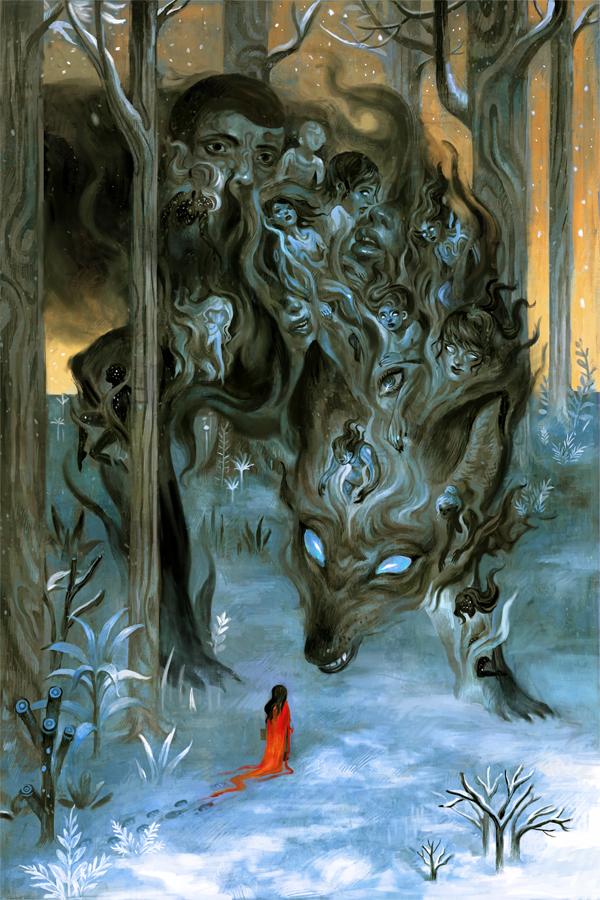This month we have three new stories by new (and newish) writers that all feature queer characters and interesting points of view. Let’s get right into it. First, if you like fairy tale retellings, check out “Toothsome Things” by Chimedum Ohaegbu, which appears in Strange Horizons. It’s an imaginative reworking of Little Red Riding Hood that’s poetic and powerful. Next, I loved “How to Swallow the Moon” by Isabel Yap, which appears in Uncanny Magazine Issue 25. This lovely novelette features a moving romance, a rad monster, and wonderful Filipino-inspired worldbuilding. Lastly, I recommend “Talk to Your Children about Two-Tongued Jeremy” by Theodore McCombs, which appears in Lightspeed Magazine Issue 102. It’s a smart and gripping story about how technology, society, and capitalism can sometimes mix together in tragic ways.

“Toothsome Things” by Chimedum Ohaegbu
“Toothsome Things” is a bold and daring reimagining of Little Red Riding Hood that asks, when men become horrifying monsters, what do women become? It’s a story about not being believed and the violence that accompanies that, about hard choices and generational trauma.
The story comes in two parts: there’s a story-within-the-story, and there’s the narrative voice that surrounds that. The two parts flow together smoothly and complement each other quite well. This story is really carried by its enchanting, poetic voice. It’s strong and fierce, sharp and wild, and even a little playful and subversive. It’s written from the perspective of a wolf, but it’s not any sort of wolf that you would expect. Meanwhile, the story-within-the-story feels like a mix between a fairy tale, a legend, and a myth. It’s about tricking the gods and tricking men, and about solidarity and survival. It’s painful, vibrant, and compelling.
Lastly, I want to note, Cindy Fan’s artwork that accompanies this story is absolutely gorgeous. Go stare at it. You really should.

“How to Swallow the Moon” by Isabel Yap
Anyag is a binukot, a girl who has been cloistered and independently tutored since birth so as to make her a more desirable bride. When the story opens, Anyag is almost sixteen, and her presentation is fast approaching. She will soon be unveiled to the whole community and married to one of her suitors. This story is told in second-person from the perspective of Amira, Anyag’s caregiver and tutor, who is only a couple years older than Anyag. Over time, Amira has slowly fallen in love with Anyag, which makes Anyag’s approaching marriage all the more daunting and painful for Amira. The story begins with Amira’s internal conflict, and then the plot complicates when a mysterious new suitor arrives.
This story features some pretty cool Filipino-inspired worldbuilding which I enjoyed and appreciated, and if you’re Filipino, I imagine you’ll love it even more. In particular, it must be said: this story features a bakunawa, a rad, ginormous monster from Philippine mythology that devours both moons and maidens. It is an awesome monster which I had not encountered before, and I loved it.
I love this story because I almost hated this story. It sets up a couple tropes that I really can’t stand, and then it skillfully subverts them. (Be warned: the rest of this paragraph spoils the plot in general details!) At first, it looks like Anyag is going to marry a man whom she barely knows. (Heck, her father is the only man she’s even seen when the story starts.) Then, that stupid marriage plan gets ditched in favor of a lovely queer romance. Yay! Later, Anyag almost sacrifices herself in order to protect both the moon and her community. The maiden-sacrifice trope really makes me want to vomit, so I was super happy when instead, Anyag and Amira teamed up to defeat the monster. I really hate those tropes in their original form, so it was a joy to watch them get subverted.
As I mentioned earlier, this story is told in second-person centering on Amira’s POV, and Yap uses this POV to tremendous effect. Amira is a character with some degree of self-deception—she knows what she wants, but she won’t let herself have it; she loves Anyag, but she won’t let herself acknowledge it. The second-person POV brings Amira’s interior conflict to the forefront—part of Amira loves Anyag, is heartbroken to see her go, and wants to act on her love, while part of Amira refuses to acknowledge her love and tries to behave in the “proper” way that society expects and demands. I think another POV wouldn’t have been able to present this conflict so strongly or to express Amira’s interior life and self-denial so powerfully. This is not the first story that I’ve highlighted in this review column this year that features a second-person POV (another was “You Can Make a Dinosaur, but You Can’t Help Me” by K.M. Szpara—another phenomenal story), so can we please start taking second-person POVs a little more seriously and stop declaring that it’s just a niche feature of choose-your-own-adventures? (Also, I feel obligated to mention, I believe N.K. Jemisin’s Broken Earth series also uses second-person, although I haven’t had a chance to read it yet.)

“Talk to Your Children about Two-Tongued Jeremy” by Theodore McCombs
At Declaration of Independence Middle School, a popular new educational app features an advanced AI and an interactive mascot, Two-Tongued Jeremy, an animated monitor lizard. Jeremy motivates students in a manner most effective for each user. Sometimes he’ll say, “Wow! I’m impressed!” Other times, he’ll say, “Well, that was disappointing, don’t you think?” And sometimes, he’ll even say, “You’re nothing without me. You’re basically just meat.”
The story begins with a scandal: Lilly Ludlow has attempted suicide following Jeremy’s abuse. Then, Aunt Sylvie asks David Marzipan whether he’s got Two-Tongued Jeremy on his phone. David does, but over the summer, he’s grown quite attached to the two-tongued devil. David lies to his aunt and keeps using the app. This story takes place within an unnamed rich, elite community. It could be anywhere, but I imagined the story taking place outside of Princeton, New Jersey, or perhaps somewhere in Connecticut. David is clearly the main character, but the story as a whole is very much about the community itself. I found this to be an intelligent, challenging, and engaging story about capitalism, exploitation/manipulation, parenting, and success. To me, McCombs’ story feels deeply contemporary and relevant to today’s discussions of toxic social media, corporate tech behemoths, government regulation of tech, and individual responsibility in regards to these issues. Don’t be fooled by the cartoonish nature of Two-Tongued Jeremy—the heart of the story is all too real.
I love the way this story handles point of view. The narration is split between third-person limited (which actually jumps between four different characters) and a first-personal-plural POV. Don’t be put off if this sounds like too much for a short story to handle—McCombs pulls it off brilliantly. The first-personal-plural POV is from the perspective of the upper (middle) class parents of the town. It’s both hilarious and a little painful to watch the scandal unfold through their eyes. While I think they do make some good points (perhaps that’s just my own bias/privilege though), they’re also haughty, indignant, and blind to their own sins. Honestly, I think the parents’ POV is reason enough to read this story. It’s a shame that first-person-plural POV is so rare, because I really love it. (Another first-person-plural story that I enjoy is Dale Bailey’s “I Was a Teenage Werewolf,” which is told from the perspective of students. And of course “Toothsome Things” also features a first-person-plural voice, although that POV is a singular entity that contains multitudes rather than a community’s collective voice.)
This story almost feels a modern day version of a classical Greek tragedy. There’s a foreboding aura in this story, a sense that the story can only end after something terrible happens. While none of the characters are true villains, they all have their small faults that play a role in precipitating the looming tragedy, and the first-person-plural POV almost even functions like a chorus, providing commentary on the events and attempting to parse out blame (while comically unaware of their own role in it all). Perhaps it’s just my background as a Theatre Arts major, but to me this story really felt like a contemporary tragedy about technology and society, and I loved that.
Lastly, I want to note, I especially liked the ending. I was invested, and although I couldn’t predict exactly how it would end, I could tell something bad was looming, if not imminent. McCombs’ writing kept me invested, curious, and guessing until the last page and ultimately left me deeply satisfied with this story.







